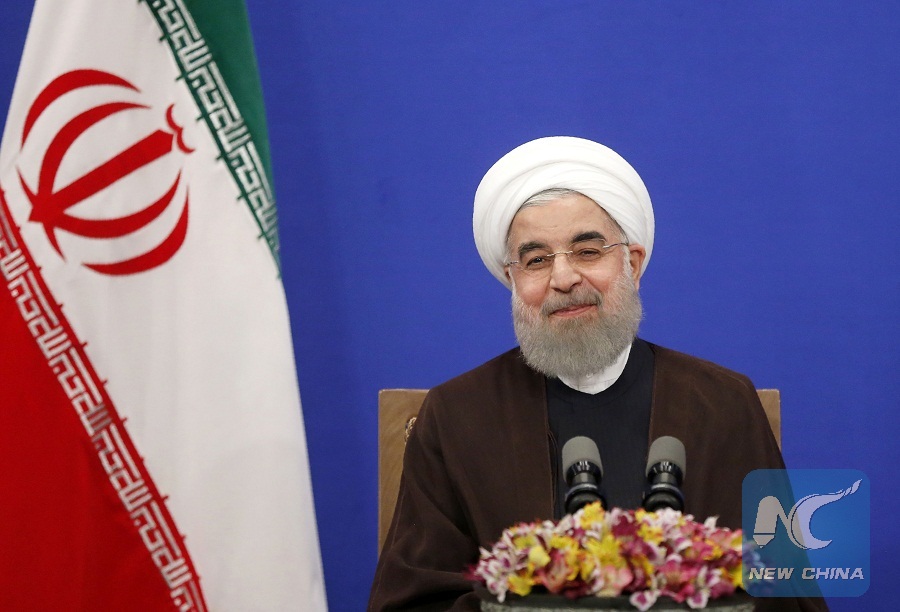
Newly re-elected Iranian President Hassan Rouhani smiles during a televised speech in the capital Tehran on May 20, 2017. Iranians have chosen the "path of engagement with the world" and rejected extremism, President Hassan Rouhani said following his resounding re-election victory. (Xinhua/AFP Photo)
TEHRAN, May 21 (Xinhua) -- Re-elected as Iran's new president, Hassan Rouhani will keep on interaction with the world and try to mend ties with Saudi Arabia, an Iranian political expert told Xinhua on Sunday.
Iran's incumbent moderate President Hassan Rouhani won the presidential election by garnering 57 percent of the votes through the Friday balloting.
His conservative challenger Ebrahim Raisi lagged behind with grasping 38.5 percent of the ballots.
"Obviously, with Rouhani's election, it would be very much the same (foreign) policies that we have observed during the past three and half years," Sadeq Zibakalam, professor of political science of Tehran University, told Xinhua.
As for Iran's relations with regional states, he added that Rouhani's next adminstration will seek normalization of ties with Saudi Arabia and negotiations over the regional conflicts.
Iran and Saudi Arabia are at loggerheads over their expansion of influence in Iraq, Syria, Yeman and Bahrain.
The Iranian Foreign Ministry announced on Monday that the Islamic republic does not seek any "tension" with Saudi Arabia.
On Saturday, Rouhani said that Iran will continue interaction with the international community and is ready to expand the cooperation with other countries.
Rouhani believes in detente with the West and even with the United States, and he has, to some extent, achieved this, Zibakalam said, adding that "he will try to maintain good and warm relations with many other countries if he is reelected."
The expert pointed to the Iranian nuclear deal and said that since Rouhani does not seek fraction with the United Sates, therefore, there is no risk for the deal's obstruction.
"At the moment, we know that the U.S. President Donald Trump wants to get rid of it, but he cannot," because Rouhani's adminstration has not violated the deal and Iran has done all its obligations, the expert said.
During his presidential campaign, Trump repeatedly criticized the Iran nuclear deal, calling it "the worst deal ever negotiated."
Iran and six world powers, including Britain, China, France, Germany, Russia and the United States, reached an agreement on the Iranian nuclear issue in July 2015 that put it on the path of sanctions relief, but with more strict limits on nuclear program.
"If the United States wants to derail the deal, other parties of the deal will not follow it," said Zibakalam.
By voting for him, the Iranians have chosen the course of interaction and "no to violence and extremism" in the world, Rouhani said in a televised speech.
The Iranians have chosen to live in peace with their neighbors and global countries, he said, adding that Iran will not accept "humiliation and threat" in mutual ties.
Earlier, another Iranian political expert, Hassan Beheshti Pour, told Aftab-e-Yazd that "We should have to be worried if Rouhani is not reelected," since in that case other countries would readjust their policies toward Iran.

